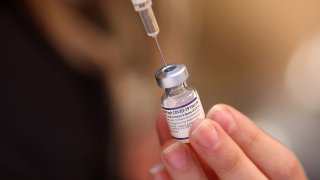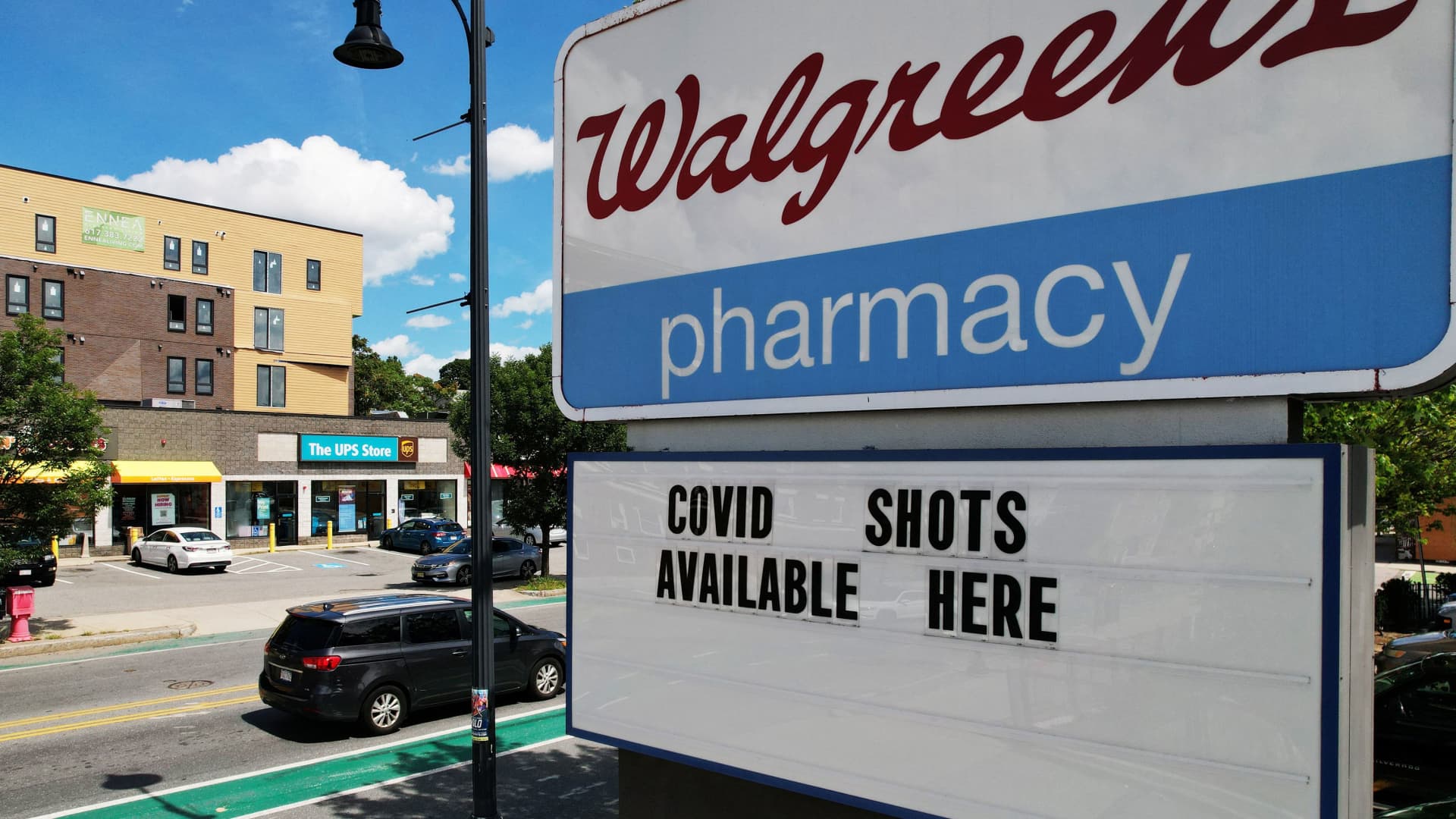
- The Centers for Disease Control and Prevention cleared updated Covid vaccines from Pfizer and Moderna following approvals from the Food and Drug Administration.
- Those single-strain mRNA shots are designed to target a relatively new omicron subvariant called XBB.1.5.
- The new vaccines from Pfizer and Moderna will be administered at pharmacies, local health departments, health clinics, community centers and other vaccine distribution sites nationwide.
A new round of Covid vaccines is finally here in the U.S.
The Centers for Disease Control and Prevention cleared single-strain shots from Pfizer and Moderna for all Americans six months and up on Tuesday, following approvals from the Food and Drug Administration on Monday. Those mRNA vaccines are designed to target a relatively new omicron subvariant called XBB.1.5.
The first doses of the new shots will be available at some pharmacies and other vaccine distribution locations within 48 hours of the CDC's recommendation, agency staff said Tuesday during a meeting of independent advisors to the CDC. That means jabs could reach Americans as soon as Thursday.
Get Boston local news, weather forecasts, lifestyle and entertainment stories to your inbox. Sign up for NBC Boston’s newsletters.
Meanwhile, the FDA is still reviewing a third updated vaccine from Novavax for people ages 12 and up.
The debut of the new shots comes after Covid hospitalizations increased for the seventh straight week in the U.S., hitting 17,418 as of the week ended Aug. 26, according to the latest data from the CDC. That number remains below the surge the nation saw in the summer of 2022.
But the recent uptick is raising concerns about how much traction Covid will gain in the coming fall and winter months, when respiratory viruses typically spread at higher levels and people spend more time indoors.
Money Report
Public health officials and health experts hope the arrival of new vaccines will help the U.S. avoid another severe Covid wave and "tripledemic" of Covid, the flu and respiratory syncytial virus, which inundated hospitals last winter. The Biden administration said last month that it will encourage eligible Americans to receive an updated Covid vaccine alongside an annual flu shot and an RSV jab approved for older adults or mothers.
Roughly 42% of Americans surveyed by the CDC in August said they "definitely will" or "probably will" get a Covid vaccine this fall, Dr. Megan Wallace, a CDC epidemiologist, said during the advisory meeting.
Here's everything you need to know about the updated Covid vaccines, from where to find them, whether you can get them for free and when to get them.
Who should get the updated Covid shots?
The CDC on Tuesday recommended that all Americans ages 6 months and older get the new shots. The agency's website outlines more specific guidelines for staying up to date on Covid vaccines, which differ depending on age group and risk level.
The CDC said that everyone ages 6 and older should get at least one dose of an updated mRNA vaccine this year, regardless of whether they've received any of the original Covid shots.
People ages 65 years and older may get an additional dose of a new Covid vaccine four or more months after a first dose of an updated shot.
Children 6 months through 5 years of age who are getting their vaccines for the first time should complete their primary series with two doses of an updated Moderna shot or three doses of a new Pfizer jab, according to the CDC. If children previously received prior vaccines, the CDC has different recommendations for how many updated doses to get.
People who are moderately or severely immunocompromised should get one or more doses of a new shot, depending on their vaccination history. Those patients are at higher risk of getting severely sick from Covid, according to the CDC.
Where can you get a new shot?

The updated shots will soon be available to eligible people at pharmacies, health clinics and community centers, among other vaccine distribution sites. Those locations will stop offering last year's bivalent boosters, which are no longer authorized for use in the U.S.
Several retail pharmacy chains told CNBC that they will start offering appointments for the new shots shortly after the CDC recommendation:
- Walgreens will allow people to schedule appointments for the new shots within 24 hours after the CDC recommendation, "with available appointments starting that week," a company spokesperson said. People can schedule those appointments through the Walgreens website or app, or by calling 1-800-WALGREENS. The company will add more appointments on a rolling basis.
- CVS Pharmacy locations will start receiving supply of the updated vaccines "later this week," a company spokesperson said. Pharmacies will receive more doses on a rolling basis and appointments will be available to schedule on the CVS website and CVS Pharmacy app.
- Albertsons expects its 1,700 pharmacies to begin administering the updated shots "as early as Friday," a spokesperson said. The company's pharmacies span stores like Safeway, Vons, Jewel-Osco, Shaw's, Acme, Tom Thumb, Randalls, United Supermarkets, Pavilions, Star Market, Haggen, Carrs, Amigos and Market Street. People can view and schedule appointments on the Albertsons website or app.
- Kroger will allow people to walk in or schedule appointments to get the new Covid vaccine at the company's pharmacies or clinics.
Americans will soon be able to use the federal website vaccines.gov to find other locations offering the updated Covid shots, according to a CDC spokesperson. The agency is still "unsure of the exact timing" for when the site will be updated to include a search filter for the new vaccines, the spokesperson added.
Later this week, uninsured and underinsured people will also be able to use the site to find locations offering the new vaccines for free through the Bridge Access Program. Around 85% of uninsured Americans live within five miles of a location participating in that program, according to Dr. Evelyn Twentyman, a CDC medical officer.
Will the new Covid shots be free?
There are slight changes to how Covid vaccines are covered in the U.S this year. But the federal government aims to ensure all people can still receive them for free.
The U.S. Covid public health emergency ended in May, which means the federal government is shifting vaccine distribution to the private market this fall.
Manufacturers will sell their updated shots directly to health-care providers at more than $120 per dose. Previously, the government purchased vaccines directly from manufacturers at a discount to distribute to all Americans for free.
All three vaccine manufacturers shared the list prices of their new vaccines during the advisory meeting on Tuesday: Moderna's shot is $129 per dose, Pfizer's is $120 per dose and Novavax's jab is $130 per dose.
Private insurers will provide the vaccines to beneficiaries at no cost. Government payers such as Medicare and Medicaid will also cover the new shots with no copayments.
For the estimated 30 million uninsured Americans, the Biden administration aims to offer shots for free through its Bridge Access Program at health centers, clinics and pharmacies across the U.S.
"We're setting up the Bridge Access Program as a temporary solution to maintain access to Covid-19 vaccines, specifically in the short term," Twentyman said during the advisory meeting Tuesday.
The program will begin as soon as vaccines have reached participating providers, which include CVS and Walgreens, according to Twentyman. Free vaccines through the program will not be available after December 2024.
The CDC's Vaccines For Children program will also provide free Covid shots to children whose families or caretakers can't afford them after the shots move to the commercial market.
How should you time your updated Covid vaccine?
People should talk to their doctors about when to get an updated shot because it largely depends on individual risk levels and situations, health experts told CNBC.
Individuals at higher risk of getting severely ill from Covid, including older adults and those who are immunocompromised, should get a new vaccine as soon as they can, according to Dr. Taison Bell, an associate professor of medicine at University of Virginia Health.
Younger, healthy adults can choose to wait so that immunity from the vaccine kicks in around the winter holidays or a specific event where they may be more exposed to Covid, Bell added.
He said Covid vaccines take around two weeks to produce an immune response against the virus, and that protection tends to last for a few months. So if a patient has upcoming travel or a large gathering to attend in mid-October, they could plan to get the new shot at the beginning of that month.
People recently vaccinated should wait two months before getting an updated vaccine, according to the CDC's Wallace. Spacing out shots will allow people to maximize the protection they get from each shot.
Those who have been recently infected can wait three months, but they can also get it "as soon as they're feeling better," Wallace added.
"You have the option to wait for three months, but it is not a requirement," she said during the advisory meeting.
How effective are the new shots?
The new shots from Pfizer, Moderna and Novavax are designed to target XBB.1.5, which has since been overtaken in prevalence by other, related strains. It only accounted for around 3% of all reported U.S. cases as of Sept. 2, according to the latest data from the CDC.
All three companies said that their updated vaccines produced robust immune responses against the now-dominant EG.5, or "Eris," variant in trials. That omicron strain is closely related to XBB.1.5 and accounted for 21.5% of all U.S. cases as of Sept. 2, according to the CDC.
They also presented preliminary trial data in June indicating that their jabs will protect against all other XBB strains. Collectively, those variants make up more than 90% of all reported cases in the U.S., according to CDC microbiologist Dr. Natalie Thornburg.
"So the take-home message is that currently, almost all circulating lineages of viruses are XBB variants," Thornburg said during the advisory meeting Tuesday.
Both Pfizer and Moderna have also released initial trial data indicating that their new shots were effective against another omicron variant called BA.2.86. Novavax on Monday said it was still testing its vaccine against that strain.
BA.2.86 has been detected in small numbers across the U.S., but health officials worldwide are watching it closely due to its high number of mutations.
Following the approvals Monday, the FDA said the "extent" of protection provided by the updated shots from Pfizer and Moderna against currently circulating variants like EG.5 and BA.2.86 "appears to be of a similar magnitude" to the protection provided by previous Covid vaccines against prior variants of the virus.
"This suggests that the vaccines are a good match for protecting against the currently circulating Covid-19 variants," the agency said in a release.
The FDA also said it is confident in the safety of the updated vaccines, noting that the benefits of the shots for people 6 months and older outweigh their risks.






